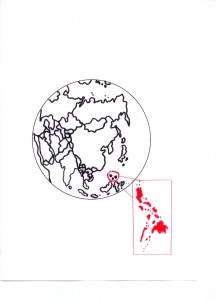PHILIPPINES
A. THE COUNTRY
The Republic of the Philippines is a country of many islands in Southeast Asia. Its location on the Pacific Ring of Fire and its tropical climate make it prone to earthquakes and typhoons but have also endowed the country with natural resources and made it one of the richest areas of biodiversity. It is a mixed agricultural and industrial economy. High population growth, corruption, social and political unrest, natural disaster, lack of foreign investment, contribute to poverty and unemployment. No government has adequately addressed land reform, tamed military excesses, limited the elite’s power or ended Muslim secessionist and Marxist guerrilla wars. Reform is being considered through changing from a Republic to a parliamentary democracy.
B. THE PEOPLE
The population is ~93,617,000. More than half are under age 20.
Official languages are Filipino and English.
~98.1% are Malayo-Indonesian Filipino (10 major peoples, 132 tribal
peoples, and 14 Muslim majority peoples).
~1.7% are Chinese and ~0.2% are Other.
Filipinos are well educated and rich in skills but work opportunities are few, so 8.1 million live abroad. Those working abroad are a crucial source of the country’s income as are electronics exports, tourism and business process outsourcing. The sex trade industry is the fourth largest source of income.
C. RELIGIONS AND CHRISTIANITY/PENTECOSTALISM
The Catholic Church has enormous influence, but emerging independent and Protestant groups exert increasing influence on social and political issues as well. Large numbers of Catholics are more influenced by animism and witchcraft than by Christianity, while surveys indicate from 15-30% of Catholics identify themselves as charismatic. There is continued growth of nearly all evangelical denominations, most marked among the indigenous Pentecostal denominations. The Muslim minority in Mindanao seeks to set up an independent Islamic state in the south.
~92.25% claim to be Christian, ~5.65% Muslim, 1.1% Non-religious, ~0.55%
Ethnoreligionist, ~0.25% Baha’i, ~0.1% Buddhist, ~0.1% Chinese.
In the Christian category:
~76.86% are Catholic, ~7.09% Independent, ~6.2% Protestant, ~0.14%
Anglican, ~0.8% unaffiliated.
Evangelicals are ~12.3% of the population, charismatics ~21.7% and of
those ~2.6% are Pentecostals.
Other groups originating in Western society represent ~5.4%.
Donna Siemens
References:
http://en.wikipedia.org
Operation World, Jason Mandryk. Colorado Springs: Biblica Publishing, 2010.

